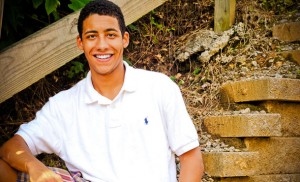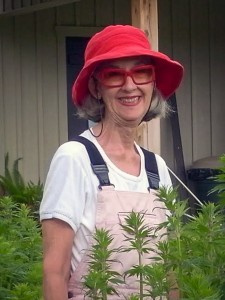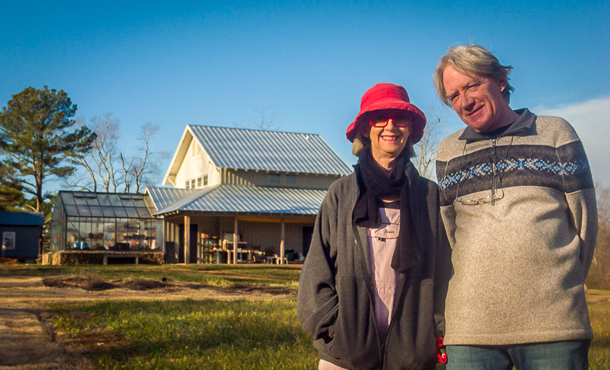When her 20-year-old grandson was murdered, long-time victim advocate Pamela Leonard, MA ’06 (conflict transformation), found herself suddenly in a new role. What she learned has strengthened her zeal for criminal justice reform. To read more about Eastern Mennonite University alumni involved in law, check out the summer issue of Crossroads, EMU’s alumni magazine.
One Monday evening in November 2012, Pamela Leonard, MA ’06 (conflict transformation), worked until dusk harvesting herbs on her farm in Lexington, North Carolina. When she got inside, a terrible message was waiting: her 20-year-old grandson had been shot by an armed robber in Atlanta. He died later that night.
For the prior 20 years, Leonard had worked with defense lawyers for people facing the death penalty. Now, she suddenly found herself cast in the role of the victim. While her grandson’s murder wasn’t prosecuted as a death penalty case, the tragedy gave Leonard new perspective on how the criminal justice system fails victims by drawing such fierce lines between prosecution and defense.
‘Confusing’ lines drawn

There was, for example, closed-circuit video footage of her grandson’s murder, which Leonard wanted to see. At first, the prosecutor refused to let her see it, for fear of giving away information critical to the case (eventually, Leonard was able to watch it). There had also been a bystander who’d remained beside her dying grandson as he said his last words. Leonard’s daughter, Allison Webb – the mother of the victim – wanted to send this person flowers as a token of appreciation. That also wasn’t allowed, to Leonard’s daughter’s great distress.
“Victims just get so confused by things like that,” says Leonard. “When you are a victim-survivor or victim of the crime, there’s a misconception that the prosecution is representing you.”
Instead, she says, prosecutors are representing the state. That means victims’ own needs – perhaps for more detail about the crime, or a better understanding of the criminal justice process – take a back seat to the prosecutor’s efforts to win a conviction. Defense lawyers, meanwhile, traditionally keep defendants under tight control, wary of revealing any information that could weaken their position in the courtroom. Victims who want to reach across these lines for whatever reason, as Leonard and her family learned, are often simply turned down.
During her career in the legal system, when she lived in Atlanta, Ga., Leonard spent most of her time working on a relatively new and somewhat counterintuitive practice known as “defense-initiated victim outreach,” or DIVO. Pioneered by the lawyers defending Oklahoma City bomber Timothy McVeigh in the 1990s, DIVO grew out of the restorative justice movement’s focus on how crime affects relationships between offenders and victims. As the name implies, DIVO essentially involves the defense team and defendant making themselves more accessible in order to meet certain needs that victims may have.
Between offender and victim: a relationship
Serious crimes like murders, DIVO advocates contend, create relationships between the offender and the victim’s loved ones. By making defendants and the defense team available to the surviving victims, DIVO can help victims meet their newly created needs in unique ways, such as providing details about the circumstances of a crime that only the offender can answer.
“I’ve now lived it,” says Leonard, looking back on her experience as a victim-survivor of a murder. “It expanded my understanding of why DIVO is needed, and why an overhaul of the criminal justice system is needed.”
In a 2006 article in The Champion, the publication of the National Association of Criminal Defense Lawyers, Leonard wrote that, from a victim’s perspective, the criminal justice system “can be overwhelming, frustrating, depersonalizing and, from their perspective, very slow, especially in death penalty proceedings.”
“The primary benefit to victims who choose to work with a defense-initiated victim outreach specialist is empowerment, which means having a clearer realization of what matters to her or him and why those goals are important,” she continued.
Leonard emphasizes that DIVO has to be a process entirely driven by victims’, not defendants’, needs. “The defense isn’t entitled access to the victims, [but] victims should be entitled to access to the defense,” she says.
DIVO advocates for ‘simple human decency’
DIVO advocates also point out that an openness to relationships with victims can benefit a defendant in the courtroom – a key point when trying to sell defense attorneys on the concept. A relationship with victims can increase the likelihood of a plea deal or serve as a mitigating factor during sentencing. Finally, Leonard makes a moral case for rethinking the traditional, walled-off nature of prosecution versus defense.
“Even if no material benefit results from reaching out to victims, simple human decency calls for defense attorneys to relate to victims with respect and compassion,” she wrote, in The Champion.
Leonard, an editor of the essay collection, Restorative Justice and Social Work, believes that DIVO is beginning to catch hold. For more than a decade, she and her colleagues in the field have done an enormous amount of outreach, educating judges, prosecutors and defense attorneys about the benefits of the approach. Federal public defenders now routinely incorporate DIVO, as appropriate, in capital cases.
Restoring the land, healing from loss
The trial of the man who killed Leonard’s grandson ended in a plea deal, for which he’s now serving a long prison sentence. Eventually, Leonard’s family was able to meet the man’s mother – a step that was an important part of their healing process.
Her experience at EMU’s Center for Justice and Peacebuilding (CJP) also played a major role in helping Leonard cope with the loss of her grandson. She says studying restorative justice with professor Howard Zehr and taking CJP’s Strategies for Trauma Awareness and Resilience, or STAR, training were particularly valuable, helping her “navigate the criminal justice system without demonizing the young man” who killed her grandson.

Several years before she became a victim herself, Leonard had already begun to step away from the emotionally draining world of capital cases. In 2008, she and her husband bought a farm in North Carolina where they now grow organic medicinal herbs.
“It was time for me to move on,” she says. “DIVO is very life-affirming [work], but it comes at a price.”
Before she arrived, the place – which they named Gentle Harmony Farm – had been conventionally farmed in corns and soybeans. Conventional agriculture and conventional criminal justice in this day and age aren’t as different as they might first seem, Leonard says. Both exact a heavy toll on their surroundings. Both could use some rethinking. As an organic farmer, she feels like she’s still fundamentally chipping away at the same sort of transformative work she’d done in the justice system.
“We want to leave this land in better condition than when we got here,” Leonard says. “There’s not an institution in this country that doesn’t need restorative justice.”
